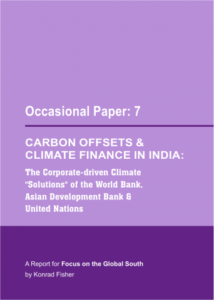
India is particularly vulnerable to the impacts of climate change, yet it has played a central role in a counterproductive global climate agenda pushed the World Bank, the Asian Development Bank, and large corporations. India now hosts more registered greenhouse gas emission reduction projects – via the United Nations Clean Development Mechanism (CDM) – than any nation except China. In theory, these CDM “offset” projects – a form of “carbon trading” – reduce global emissions when developed nations avoid emission reductions at home by funding less expensive emissions reductions in developing nations. In reality, offset projects produce large quantities of greenhouse gases, pollute the local environment, and displace villages.
The World Bank and Asian Development Bank have become leading proponents of offset projects in India by committing their own resources, and by controlling international funding sources that would otherwise be managed within the more democratic, albeit flawed, United Nations climate framework. Moreover, these two multilateral banks have repackaged their existing corporate-friendly agenda as a solution to the climate crisis, while creating new climate governance programs intended to replace those of the United Nations.
Although it must overcome corporate influence and eliminate existing carbon trading programs, the United Nations – not multilateral banks – remains the most viable multilateral body available to manage climate-related finance and international agreements.
Download the pdf version of this publication here





